Japan’s Path
Japan's enduring economic challenges serve as both a cautionary tale and a beacon of resilience.

File photo of (L) Japanese Ambassador to India Kenji Hiramatsu with (R) Assam Chief Minister Sarbananda Sonowal in Guwahati in January (Photo: IANS)
Ahead of the plenary session of the Nuclear Suppliers’ Group (NSG) in Switzerland in June, Japan has strongly favoured India’s admission to the 48-member nuclear cartel and stated that it respected the position taken by New Delhi on the China-Pakistan Economic Corridor (CPEC) based on the principle of territorial integrity and sovereignty.
“We are working together closely with India on the (NSG) issue and we want India to become a member of the NSG as soon as possible,” Japanese Ambassador to India Kenji Hiramatsu said in an interview to The Statesman. Asked why China was opposing India’s entry into the elite group, he said, “Please ask this question to China.”
The Japanese envoy’s comments came within days of China saying it would oppose India’s unilateral entry into the NSG, pending a consensus on the membership issue. China is also said to be under pressure from its ‘all weather’ ally Pakistan to ensure that India was kept out of the nuclear cartel.
Advertisement
Referring to the India-Japan civil nuclear deal that was signed in November 2016, Hiramatsu pointed out that the Lower House of the Japanese Parliament had passed it on 16 May and it had to now get the approval of the Upper House. He hoped the Upper House will also approve the pact as soon as possible so that it becomes operational.
On whether Japan endorsed India’s opposition to the CPEC on the ground that it runs through Pakistan-occupied Kashmir (PoK), Hiramatsu said, “As a strategic partner, Japan has been discussing all issues with India, including CPEC. We understand and respect the position taken by India based on the principle of territorial integrity and sovereignty.’’
He said Japan was carefully watching China’s ‘One Belt, One Road (OBOR)’ initiative, hoping that it will be open to all and based on international standards. “China is Japan’s neighbour and we will like to have a constructive relationship with it.”
Asked how Japan looked at the situation in South Asia with relations between India and Pakistan touching a new low, Hiramatsu said as a strategic partner of India, Tokyo was keeping a watch on the ties between New Delhi and Islamabad as well as the situation in Kashmir. “We have been informed by India about the situation in Kashmir.”
On how he rated the prospects of the ‘G-4’, comprising India, Japan, Germany and Brazil, becoming permanent members of the UN Security Council, he hoped there will be progress at the ongoing Inter-Governmental Consultations on the issue at the UN. “We hope Japan and India will become members of the Security Council in the very near future.”
He said it was difficult to explain why China was adopting a rigid position on the South China Sea. Japan’s position was that the issue of maritime domain should be in accordance with the international law, he said, adding, “We expect to resolve and settle conflicting issues peacefully. Any action that escalates tension should be avoided.”
On whether the India-Japan-US trilateral dialogue was aimed at containing China, the envoy said the dialogue had been initiated since the three countries were key global players and shared same values like the rule of law, open societies and democracy.
Advertisement